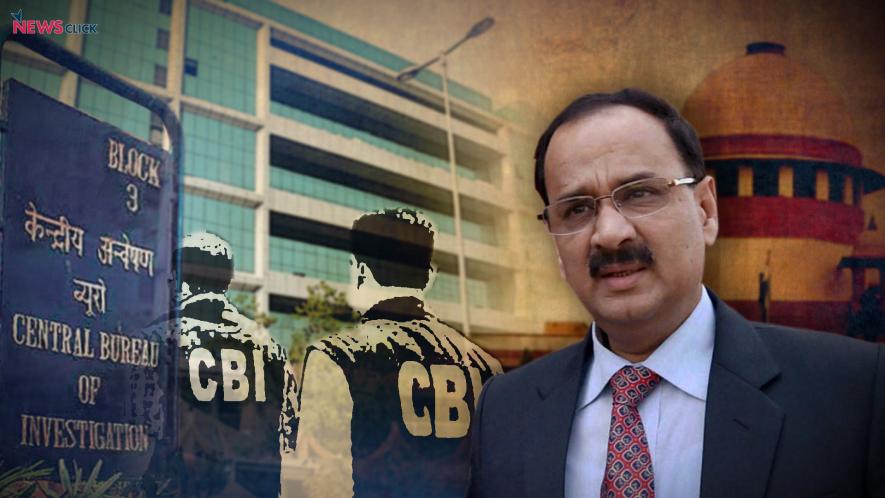Supreme Court Reinstates Alok Verma as CBI Director, But With a Caveat

Questioning the Narendra Modi government for its tearing hurry in divesting dissident CBI Director Alok Verma of his powers on the intervening night of October 23-24 last year, the Supreme Court today reinstated the ousted officer, but with a major caveat.
The court, ruling through a bench comprising CJI Ranjan Gogoi and Justices Sanjay Kishan Kaul and KM Joseph, ruled that though Verma (who is to retire on January 19 this year) has been reinstated to his post, he will be barred from taking any policy decisions till he is cleared by the Chief Vigilance Commission regarding the corruption charges filed against him by his bete noire Rakesh Asthana. The court also ruled that any further decision against Verma would be taken by the high-powered committee (comprising the PM, the CJI and Leader of the Opposition), which selects and appoints the CBI Director.
Broad Interpretation
Giving a wide interpretation to Section 4B of the Delhi Special Police Establishment Act (which governs the CBI), the bench ruled that the term “transfer” in the provision has to be construed in a manner which deals with any sort of interference into the independence of the CBI director, and that the government was wrong in saying that though Verma was hurriedly divested of his powers, he hasn’t been sacked or transferred. The court agreed with the contentions of Senior Advocates Fali Nariman and Sanjay Hegde that by sending Verma on leave abruptly, the government’s action (though an attempt was made to give it a patina of legitimacy under the cover of a Central Vigilance Commission decision) reeked of vengeance against an honest officer and meant effective removal, thus impinging upon the statutory protection given to his post by the apex court’s ruling in the Vineet Narain case.
The tenure of the director as per Section 4B is a minimum of two years. The provision that follows is extremely relevant to the events currently taking place in the CBI. Section 4B (2) says that the transfer of a director could only be done by the appointment committee mentioned above. Even for removal, as per Section 4A(1) of the Act, the consent of the appointing committee is mandatory.
As reported by The Hindu¸ the court held that the DSPE Act gave neither the CVC nor the government the power to take him off from his functions and duties. These authorities cannot assume superintendence over the CBI director when there is no legislative intent to back their assumption. The three-judge bench unanimously held that what the government has done in Verma’s case is to effectively remove him by divesting him of all his powers, and appointing Nageshwar Rao as the director. This is in opposition to the law because the appointing committee’s consent was not sought, as the law mandatorily requires. That the government has termed this only as an interim measure does not wash because for all practical purposes, Verma’s tenure has been curtailed.
Implications of the Ruling
The court has restrained Verma from taking any policy decisions till he is cleared by the CVC Committee headed by KV Chowdary , who has a “murky past”, and is close to the Modi-Amit Shah establishment as alleged in a recently released book by two investigative journalists. This brings one to the question: can Verma direct the CBI to lodge a preliminary enquiry (PE) in the Rafale case which would bring the Modi government further under the scanner. As commonly understood, it is a part and parcel of the routine duty of the CBI to lodge a PE whenever it receives information about the commission of an offence. This cannot be termed as a policy decision. However, the government is likely to argue it is one if Verma actually embarks upon such a course of action, especially because Rahul Gandhi has alleged that Verma’s ouster was because of his investigations into the deal.
It also remains to be seen whether Verma rescinds his replacement’s decision of ordering raids on Akhilesh Yadav since the latter is said to have formed a pact with Mayawati, a strong leader with a significant vote share, and opposed to the ruling BJP.
Operation Successful, Patient Dead?
The Supreme Court’s today’s decision comes a bit too late, according to some of the legal and political commentators. What was its need to direct the CVC report against Verma to be submitted in a sealed cover, and then sit on it for days (including the vacation) when the judges knew very well that Verma would be left with little of an effective tenure? Legal scholar and commentator Gautam Bhatia who has criticised in detail the supreme court’s “sealed cover jurisprudence”, tweeted “I see that the SC has stuck to its time-honoured practice of grand perorations through the course of the judgment, and then diluting the actual, operative order.”
Thus, the ruling reinstating Verma can be said to have come as a bandage to a leaking roof – though high in rhetoric, carrying little real significance.
Get the latest reports & analysis with people's perspective on Protests, movements & deep analytical videos, discussions of the current affairs in your Telegram app. Subscribe to NewsClick's Telegram channel & get Real-Time updates on stories, as they get published on our website.
























